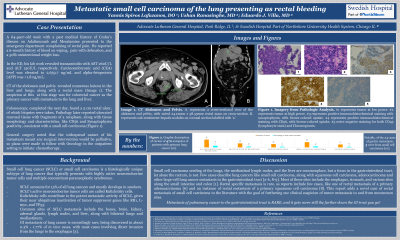Sunday Poster Session
Category: Colon
P0307 - Metastatic Small Cell Carcinoma of the Lung Presenting as Rectal Bleeding
Sunday, October 22, 2023
3:30 PM - 7:00 PM PT
Location: Exhibit Hall

Has Audio

Yannis S. Lafazanos, DO
Advocate Lutheran General Hospital
Long Grove, IL
Presenting Author(s)
Yannis S. Lafazanos, DO1, Ushan A. Ranasinghe, MD, MS2, Eduardo Villa, MD3
1Advocate Lutheran General Hospital, Long Grove, IL; 2Swedish Hospital, part of Northshore University Health System, Chicago, IL; 3Swedish Covenant Hospital, Chicago, IL
Introduction: Small cell carcinoma is a unique subtype of lung cancer that, given its histologic features, metastasizes quickly throughout the body. Common sites of metastasis include the liver, bones, and brain. It uncommonly spreads to the gastrointestinal tract with most cases involving direct invasion through the esophagus, and fewer reported cases in the more distal tract. This report presents a unique case of small cell carcinoma with rectal metastasis as the initial presentation in an effort to heighten our suspicion of small cell lung cancer and its propensity to metastasize.
Case Description/Methods: A 64-year-old male with longstanding Crohn’s disease and a 0.03 pack/yr smoking history presented to the emergency department complaining of rectal pain. He had been following with gastroenterology for 6 months with similar symptoms, and presented with continued blood on wiping, pain with defecation, and a 50lb unintentional weight loss. In the ED, his labwork noted transaminitis with AST 260 U/L, ALT 150 U/L, ALP 175 U/L and an elevated CEA 2,659.7 ng/mL. A CT of the abdomen revealed numerous suspected metastatic lesions in the liver and lungs, along with a rectal mass (Image 1). Colonoscopy, completed the next day, found a 5cm rectal ulcer, biopsies were taken and pathology reported ulcerated mucosal tissue with fragments of a neoplasm consistent of a small cell carcinoma.
Discussion: Upon presentation, the impression was that the primary source of malignancy was the colon. Rectal biopsy, however, revealed that a Small Cell Carcinoma of the lung was the primary. Small cell carcinoma seeding of the lungs, lymph nodes, and liver are commonplace, but a focus in the gastrointestinal tract, let alone the rectum, is not. Few cases describe lung cancers like small cell carcinoma, along with squamous cell carcinoma, adenocarcinoma and other large-cell lung cancer metastasis to the gastrointestinal tract. Most of these sites include the esophagus, stomach, and various sites along the small intestine and colon. Rectal specific metastasis is rare, as reports include few cases, like a primary adenocarcinoma and squamous cell carcinoma. This report adds a novel case of rectal metastasis of small cell carcinoma to the literature with the goal of furthering our clinical suspicion of tumor metastasis to and from uncommon sites.

Disclosures:
Yannis S. Lafazanos, DO1, Ushan A. Ranasinghe, MD, MS2, Eduardo Villa, MD3. P0307 - Metastatic Small Cell Carcinoma of the Lung Presenting as Rectal Bleeding, ACG 2023 Annual Scientific Meeting Abstracts. Vancouver, BC, Canada: American College of Gastroenterology.
1Advocate Lutheran General Hospital, Long Grove, IL; 2Swedish Hospital, part of Northshore University Health System, Chicago, IL; 3Swedish Covenant Hospital, Chicago, IL
Introduction: Small cell carcinoma is a unique subtype of lung cancer that, given its histologic features, metastasizes quickly throughout the body. Common sites of metastasis include the liver, bones, and brain. It uncommonly spreads to the gastrointestinal tract with most cases involving direct invasion through the esophagus, and fewer reported cases in the more distal tract. This report presents a unique case of small cell carcinoma with rectal metastasis as the initial presentation in an effort to heighten our suspicion of small cell lung cancer and its propensity to metastasize.
Case Description/Methods: A 64-year-old male with longstanding Crohn’s disease and a 0.03 pack/yr smoking history presented to the emergency department complaining of rectal pain. He had been following with gastroenterology for 6 months with similar symptoms, and presented with continued blood on wiping, pain with defecation, and a 50lb unintentional weight loss. In the ED, his labwork noted transaminitis with AST 260 U/L, ALT 150 U/L, ALP 175 U/L and an elevated CEA 2,659.7 ng/mL. A CT of the abdomen revealed numerous suspected metastatic lesions in the liver and lungs, along with a rectal mass (Image 1). Colonoscopy, completed the next day, found a 5cm rectal ulcer, biopsies were taken and pathology reported ulcerated mucosal tissue with fragments of a neoplasm consistent of a small cell carcinoma.
Discussion: Upon presentation, the impression was that the primary source of malignancy was the colon. Rectal biopsy, however, revealed that a Small Cell Carcinoma of the lung was the primary. Small cell carcinoma seeding of the lungs, lymph nodes, and liver are commonplace, but a focus in the gastrointestinal tract, let alone the rectum, is not. Few cases describe lung cancers like small cell carcinoma, along with squamous cell carcinoma, adenocarcinoma and other large-cell lung cancer metastasis to the gastrointestinal tract. Most of these sites include the esophagus, stomach, and various sites along the small intestine and colon. Rectal specific metastasis is rare, as reports include few cases, like a primary adenocarcinoma and squamous cell carcinoma. This report adds a novel case of rectal metastasis of small cell carcinoma to the literature with the goal of furthering our clinical suspicion of tumor metastasis to and from uncommon sites.

Figure: Image 1. CT of the Abdomen and Pelvis. Note 24.12mm x 38.59mm rectal mass on cross-section on image 'A'. Note sub-centimeter hepatic nodules on coronal section indicated via arrow 'a' on image 'B'.
Disclosures:
Yannis Lafazanos indicated no relevant financial relationships.
Ushan Ranasinghe indicated no relevant financial relationships.
Eduardo Villa indicated no relevant financial relationships.
Yannis S. Lafazanos, DO1, Ushan A. Ranasinghe, MD, MS2, Eduardo Villa, MD3. P0307 - Metastatic Small Cell Carcinoma of the Lung Presenting as Rectal Bleeding, ACG 2023 Annual Scientific Meeting Abstracts. Vancouver, BC, Canada: American College of Gastroenterology.
